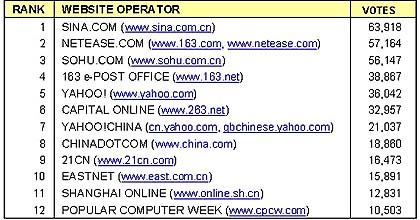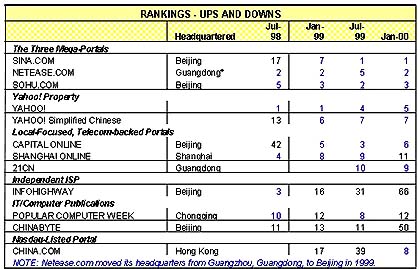 |
Analysis Internet Development in China: An Analysis on CNNIC Survey Reports VI. THE MOST POPULAR WEB SITES IN CHINA, ACCORDING TO JANUARY 2000 CNNIC SURVEY RESPONDENTS CNNIC's semi-annual surveys let respondents name three to five Web sites they visited most frequently. The CNNIC report then ranked the top Web sites according to the number of votes each received from the survey respondents. The Top 12 Web sites voted for by the respondents in the 1999 year-end survey were:
The top three Web sites, claiming 34 percent of the total votes, are mega-portals with millions of daily page views. Sina.com, reputed for its online news coverage, was a product of merger at the end of 1998 between a mainland Chinese Web site and a California-based Chinese American community Web site. Sohu.com, a Chinese site that aspires to the Yahoo! model, was established at the end of 1997 by a Chinese graduate of MIT with some US$250,000 in startup capital from the digital advocate and MIT professor Nicholas Negroponte and his colleagues. Both Sina.com and Sohu.com registered their headquarters in the United States while Netease.com is truly homegrown, started by a young telecom graduate with proprietary technologies, including a full-text Chinese search engine and a Chinese-enabled Web-based free email system. Netease.com claims to be the first and largest Chinese Web site that offers free personal Web page hosting and virtual community services. It was ranked the No.1 most popular Chinese Web site (excluding Yahoo!) in CNNIC's July 1998 and January 1999 survey reports before it was beaten by Sina.com and Sohu.com. The top-three mega-portals are all awaiting a NASDAQ listing, subject to the approval of Chinese securities regulatory commission. Eleven out of the 66 Web sites listed on the CNNIC January survey report, including Yahoo! and Yahoo!China, Hotmail, and the corporate Web sites of Microsoft, IBM, and Intel, are truly foreign-owned. (In the Chinese version of the CNNIC report, Yahoo! Web sites are not included to the top-10 list). Of the 66 sites, 55 of them are Chinese-language sites. Those 55 sites represent 49 Web site operators. Among them 19 are headquartered in Beijing, 10 in Shanghai, 10 in Guangdong (including Netease.com, which left Guangzhou in the second half of 1999), two in the Central province of Henan, one in the Southwestern municipality of Chongqing and one in Hong Kong. Another six provinces have one Web site each voted onto the list. It is remarkable that the only Web site each of the six provinces has is run by China Telecom's local branch, and almost all of the eight Web sites are run on the platforms provided by ChinaInfo, or the 169 Network. Altogether, at least 17 out of the 49 Web sites properties are run by China Telecom or its affiliates. Backbone Breakdown Unlike ChinaNet, The 163 Network considers its premier job the provision of commercial Internet access services to the public. ChinaInfo was at its very beginning commissioned by the Chinese Government to provide Chinese language content on the Internet. The 169 Net, locally, comprises a citywide intranet called "Info-Port," running over local telephone networks and providing open access for local residents. Shanghai Online, Capital Online, and 21CN are three examples. It can be concluded that although the top-3 mega-portals are privately owned, the backbone of China's ICP services, as well as its ISP services, is still state-owned and state-controlled. This is still particularly this case in China's Central and Western regions. At least six Web sites on the list were established by returned U.S.-educated Chinese graduates backed by U.S. venture capital: Sohu.com, ChinaRen, NetBig, EachNet, eTang.com, and eGuo.com. China's pioneering ISP, InfoHighWay, was also established by a returned Chinese national who was educated in the U.S. eTang.com was launched in November 1999 in Shanghai with a high-profile promotional blitz, aiming at bridging two worlds--China's virtual community and its retailing community. In January this year, eTang.com raised US$40 million from a syndicate of investment firms that are largely newcomers to China. Among the 49 most popular Web sites/properties is MyWeb--launched by Chinese American entrepreneurs targeting China's potential vast Internet audience via TV set-top-boxes--as well as PChome and Dreamer, the mainland branch-outs of two Taiwan portals. The NASDAQ-listed and Hong Kong-based Chinadotcom (China.com) Corporation had two Web sites near the top of the original list: china.com, at No.8, and cww.com (China Wide Web), at No.14. Combined, Chinadotcom is ranked the No.6 Web site/property. How Chinadotcom managed its Web sites to rocket up from No.39 on the previous list just six months ago remains mysterious. Eight to ten Web sites on the list were established by home-groomed Chinese entrepreneurial IT professionals, including Stone RichSight--the pre-merger, mainland half of Sina.com, whose American half was called sina.net; Netease.com, and 8848.net--China's pioneering e-commerce Website which models itself after Amazon.com. Also included on the list are two personal Web sites, Newhua.com and Goldnets.com, both of which were recently bought by Myrice.com, a Hong Kong-based Web startup launched by the 21-year-old son of Chinadotcom's CEO. Surprise Sites Among the top 49 Web site property operators, 17 provide Internet access services, including the network service providers (NSPs), the Beijing and Shanghai telecommunications administrations. Seven others are IT-focused, publishing online IT news or software downloading services. China's first joint venture ICP, ChinaByte, was established as early as 1997 by Rupert Murdoch's News Corporation and the Communist Party's mouthpiece newspaper The People's Daily. For unknown reasons, ChinaByte dropped in the ranking to the 50th position from its No. 11 spot in the previous survey. Meanwhile, the online edition of China's largest computer newspaper, Popular Computer Week, managed to remain on the top-12 list. China Computerworld and China InfoWeb, another two computer newspapers run by IDG-invested joint ventures, have not been on the list in the two most recent surveys. IDG (International Data Group) runs 18 IT/computer newspapers and magazines in China through joint ventures with majority interests, and produces 12 conferences and expositions in China alone. In 1997 IDG claimed 80 percent of China's IT/computer publishing market and more than a 90 percent share of the computer advertising revenues in China. Two e-commerce Web sites, 8848.net and EachNet, which models itself after eBay.com, are among those on the list. Both of them were launched in the second half of 1999. While no Internet banking Web sites appear on the list, two stock quote and financial information providers, Stockstar and Homeway, are ranked No. 30 and 40 respectively. Some ten Web sites were launched less than a year before the survey was conducted. WHO'S MISSING
News/Media Heavyweights:
Entertainment Web sites:
HIGH-PROFILE FOREIGN-INVESTED OR VENTURE CAPITAL-BACKED SITES
E-Commerce: WHO'S FADING OUT In the July 1998 CNNIC survey report, three of China's five backbone providers, and three university Web sites were voted into the 53 most popular Web sites in China. They are all gone from the list in the Jan 2000 survey, along with those pioneering independent ISPs--the "early birds", such as China Economic Information Net (CEINet), ReadChina, and NetChina. Infoseek, ZDNet, IDG's China Computerworld, and China InfoWeb faded away by 1998, as had AsiaOne, Singapore's simplified Chinese language newspaper Web site. Now a great many of China Web sites provide domestic, international, sports and industry-specific news, and some online news providers even manage to evade the effective media censorship and republish and/or translate sensitive China news and commentaries from overseas media. This has already upset the Chinese authorities, and an online news media monitoring and control system modelled on the one already in place for traditional news media is likely to begin operation soon. Compared to Infoseek, which has had no Chinese version so far, Netscape's Netcenter is one of the first Internet heavyweights which launched localized, Chinese-version Web sites in China, but its Yahoo!-like Chinese directory portal has not caught enough Chinese attention.
VII. THE CREDIBILITY OF CNNIC SURVEY REPORTS |
 This Article Previous Articles
|
||||||||||||||
|
Infotech: News | Analysis | Reviews | Perspectives | Events | Resources Home | Search | News | Trade | Finance | Infotech | Leisure | Shop |
|||||||||||||||
| ©1999 - 2000 Virtual China, Inc. All rights reserved. | |||||||||||||||

